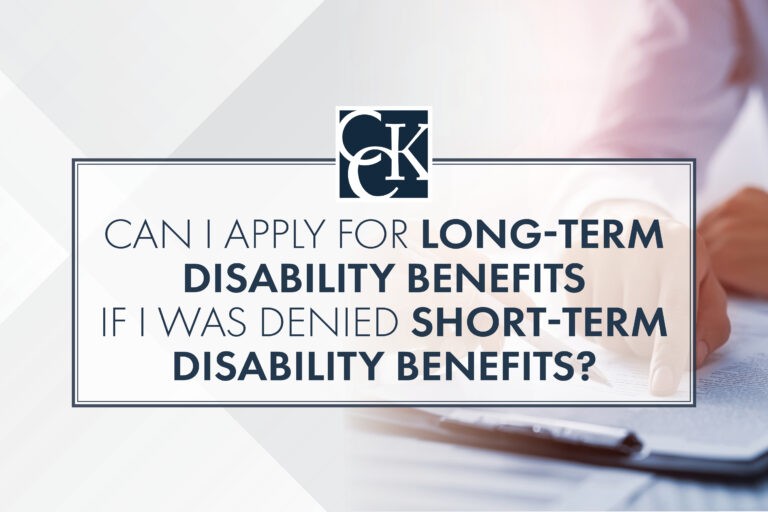Can I Apply for Long-Term Disability Benefits If I Was Denied Short-Term Disability Benefits?

The idea of missing work for any length of time is a troubling one. However, this is the reality for many hard-working professionals across the country. As such, it is common to have a disability insurance policy. These policies can include short-term disability (STD) and long-term disability (LTD) coverage. When you develop a condition that prevents you from working, these policies help protect your income.
However, there are misconceptions about such policies. Some professionals will apply for short-term disability benefits, but if their insurer denies their claim, they may not know what to do. They may wonder: “Can I apply for long-term disability benefits if I was denied short-term disability benefits?”
In short, typically yes, you can apply for LTD benefits even if your insurance company denied your STD claim, although it is not always this straightforward. Read on to learn what else you need to know about applying for long-term disability benefits after a short-term disability denial.
What Are Short- and Long-Term Disability Benefits?
Short-term disability benefits are meant to cover a person for about three to six months. There are several reasons a claimant may only need a shorter benefit period. For example, pregnancy is a condition that some STD policies may cover. Likewise, STD may also cover surgery with a relatively quick recovery period.

Long-term disability benefits, on the other hand, are meant to cover a person for an extended period when they are unable to work due to a medical condition. Many LTD policies are governed by the federal law known as ERISA.
Nonetheless, a person may also seek short-term disability benefits even if they are expected to be out of work for a longer period. Most long-term disability insurance policies have a waiting period, usually 90 – 180 days. In such scenarios wherein the claimant has both types of policies, STD benefits can cover the claimant’s income during this LTD waiting period. After the waiting period, these short-term benefits would transition into long-term disability benefits.
Are Long-Term Disability Benefits Possible After a Short-Term Disability Claim Denial?
Your insurer may deny your short-term disability claim. In this situation, you may wonder if you can still file for long-term disability or if you have lost that opportunity.
Many claimants may believe that to receive long-term disability benefits they must first receive STD benefits. While some disability plans require this, many do not. It is best to thoroughly read your plan documents and policies as they contain the provisions that govern your claims.
Luckily, if your insurer denies your short-term disability claim, then you can likely still apply for LTD benefits. In short, you have typically not lost your opportunity for LTD benefits in such a case.
Do Not Wait to File for Long-Term Disability Benefits
Claimants who appeal an STD denial may feel that they should wait for a decision before applying for long-term disability benefits. However, you should not necessarily wait to file for LTD benefits.
Your LTD policy will outline specific deadlines for filing an initial claim. Many insurance companies may require you to file a long-term disability claim within 180 days, though this deadline may be shorter or longer depending on your policy.

Nevertheless, if you fail to file by your policy’s deadline, then you may lose your right to benefits. These deadlines are typically tied to the date on which your disability began.
Now, when you appeal a short-term disability denial, your insurance company typically has 45 days to issue a response. However, there are extensions your insurer may use to prolong the time they have to issue a decision on your claim.
Therefore, depending on when your STD claim was denied and when you filed your appeal, it is possible that you will not get an appeal decision prior to the deadline to file your LTD claim.
Call CCK Today for a Free Case Evaluation
If you applied for short-term disability benefits, but your insurer denied your claim, you can likely still apply for long-term disability benefits. This process, however, can get complicated. The attorneys at Chisholm Chisholm & Kilpatrick can help.
Call us today at (800) 544-9144 for a free case evaluation with a member of our team. We will evaluate your case and see if we can assist you.
About the Author
Share this Post
